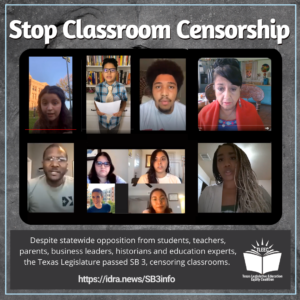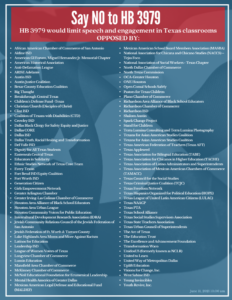Learn About Texas Classroom Censorship Laws

On September 2, 2021, the Texas Legislature passed Senate Bill 3, which replaces HB 3979 that became law on September 1, 2021, severely limiting the civic development of students as well as the ability of teachers and school leaders to guide student development in civic spheres. This hindrance is in stark contrast to a core mission of the Texas public education system: ensuring all Texas children are able to fully participate now and in the future in the social, economic and educational opportunities of our state and nation.
Just out!
Knowledge is Power is IDRA’s national resource for educators and advocates to help you do your work for equity and excellence in education in the midst of classroom censorship policies.
IDRA’s Southern Education Equity Network website is a forum for concerned parents and caregivers, students, community members, and organizational and coalition friends who advocate for public education and student success across the U.S. South.
IDRA Position on Classroom Censorship plus news on the “chilling effect”
What Texas’ Classroom Censorship Law Means for Students & Schools (PDF)
Students Tell Texas Attorney General that Racial Discrimination in School is Real – IDRA Applauds Students Speaking Out Against Texas’ New Classroom Censorship Law (Español), September 29, 2021
88 public school students described their experiences with racial discrimination in school
The Classroom Censorship Law in Texas


The bill will cost school districts money as they have to replace textbooks and other course materials that contain concepts prohibited by the law. It prohibits instruction and discussions about certain concepts related to race, sex, diversity and discrimination in social studies, history, government and civics courses. This means that:
- School districts will not be able to support their teachers, staff and students to have conversations about important issues that impact our society,
- Educators will not be able to effectively teach their students and encourage participation and learning,
- Students will not be able to fully explore and engage in social studies, civics, current events and history, and
- The State Board of Education will not be able to fully execute its duties, including setting accurate social studies curriculum standards.
SB 3 discourages teachers from discussing current events in social studies courses. These discussions are a critical part of learning and social-emotional wellness.
SB 3 prohibits students from receiving course credit for participation in activities and organizations that encourage civic engagement, including engagement in our public policymaking and legislative processes.
SB 3 prohibits important schoolwide training for teachers, administrators, state agency employees, and school district or charter school staff on race and gender diversity and inclusion practices related to social studies, history, government and similar subjects.
SB 3 prohibits school districts, charter schools or state agencies from seeking private funding to develop curriculum, training or materials for courses in the social studies curriculum.
Advocacy Tools
Texas’ Newest Classroom Censorship Bill: SB 3 • (Español)
See List of Organizations Opposing Texas HB 3979, June 11, 2021
See video from our Coalition Against Texas HB3979 Virtual Press Conference
See video from our Save Civics! Virtual Town Hall
See opposition letter by the American Historical Association
See letter by 229 historians against HB 3979
Notice: Speak Up to Free Our Schools! Hearing on Thursday, July 15
Webinar recording: Whitewashing the Truth in Schools: An Update on Texas’ HB 3979
Texas’ House Bill 3979 and similar bills across the country are being used to whitewash history and limit how teachers and students can discuss racism, sexism and our country’s history of discrimination. In IDRA’s first Ed Policy Summer Camp session, we will share how these harmful bills will impact students and ways we can organize to protect learning in schools.
Testimony and Statements Against Classroom Censorship
IDRA Statement on SB 3 Passage: Texas Doubles Down on Classroom Censorship at Students’ Expense
Texas policy update with TLEEC statement in English • (Español)
One-pager about the bill: Texas Newest Classroom Censorship Bill SB 3 in English • (Español)
Video Gallery: Student Testimony Against Classroom Censorship
SB 3 Claims That Talking About Racism and Race is Racist. — IDRA Testimony against SB 3 in 87(2) session, presented by Ana Ramón to the Texas Senate State Affairs Committee, August 10, 2021 – See video
Banning Critical Conversations in the Classroom Hurts Texas Students – IDRA Testimony against SB 3 in 87(2) session, presented by Chloe Latham Sikes, Ph.D., to the Senate State Affairs Committee, August 10, 2021 – See video
Censorship is Hurtful – SB 3 and the Underlying HB 3979 Hurt all Students – IDRA Testimony Against SB 3, presented by Morgan Craven, J.D., to the Senate State Affairs Committee, July 15, 2021 – See video
Allow Texas Students to Take in More Information, Not Less – IDRA Testimony against SB 3, presented by Araceli García – See video
Don’t Deny Students Important Information to Work for a Better Future – IDRA Testimony against Texas Senate Bill 3, presented by Ana Ramón to the Senate State Affairs Committee, July 15, 2021 – See video
Reject the Erasure of Race in Texas Schools in SB 3 – IDRA Testimony against Texas Senate Bill 3, presented by Dr. Altheria Caldera to the Senate State Affairs Committee, July 15, 2021
HB 3979, the “How-to Guide for Whitewashing History,” Likely to Become Law, IDRA Statement, May 30, 2021
HB 3979, the “How-to Guide for Whitewashing History,” is Derailed by Procedural Move, IDRA Statement, May 28, 2021
HB 3489 Supports Digital Health and Wellness, Which Are Essential to Supporting Students – IDRA comments in support of HB 3489, Submitted by Christina Quintanilla-Muñoz to the Texas House Public Education Committee, April 20, 2021
Background
Murky language that disallows districts or teachers from making “part of a course… political activism, lobbying or efforts to persuade members of the legislative or executive branch” can only be seen as an attempt to stifle civic development. Engagement in the political sphere – through activism, lobbying or contacting congressional representatives – is undoubtedly part of past, current and future experiences for all Texans.
Blockading student development in this way would intentionally prevent the development of future Texas leaders, many of whom will graduate from Texas schools. We should instead be celebrating the efforts of districts, teachers and students who are actively engaging in building a future Texas for all Texans.
These bills create footholds for the mischaracterization of diversity, equity and inclusion efforts. The impact of this mischaracterization, and of the passing of this legislation, is a decided step backward in efforts to promote equity throughout the state of Texas. Banning or limiting discussion on the role of race or sex in historical contexts and processes is a disservice to those who have been unduly targeted on the basis of their race or sex, both historically and in the present day. Additionally, banning these concepts is contrary to our current TEKS. We cannot turn away from the lived realities of racism and sexism as if doing so would clear their harms and histories. To stifle discussion in this way is to disjoint social studies curriculum – and thus student learning– from the very real injustices Texas communities have faced.
SB 3 and HB 3979 are at their worst attempts to hinder free speech. An education that prohibits active engagement in civic discourse, action or activism is directly at odds with the goal of full democratic participation. Prohibition of discussion of race or sex in social studies contexts, given their centering in moments of injustice and attempts to rectify injustice, similarly limits students’ potential acumen in society.
With these measures being enacted, our students lose the opportunity to either garner practical skills needed to engage in civic processes or learn requisite knowledge to make informed equity-minded decisions. Proceeding in this way is akin to teaching a child the physics of riding a bike without ever letting them ride one.
For questions, please contact TLEEC through Ana Ramón (ana.ramon@idra.org). The Texas Legislative Education Equity Coalition (TLEEC) is a collaborative of organizations and individuals with the mission to improve the quality of public education for all children, with a focus on racial equity. The coalition convenes organizations and individuals who advocate in the interest of public school students at the local, state and national levels.

